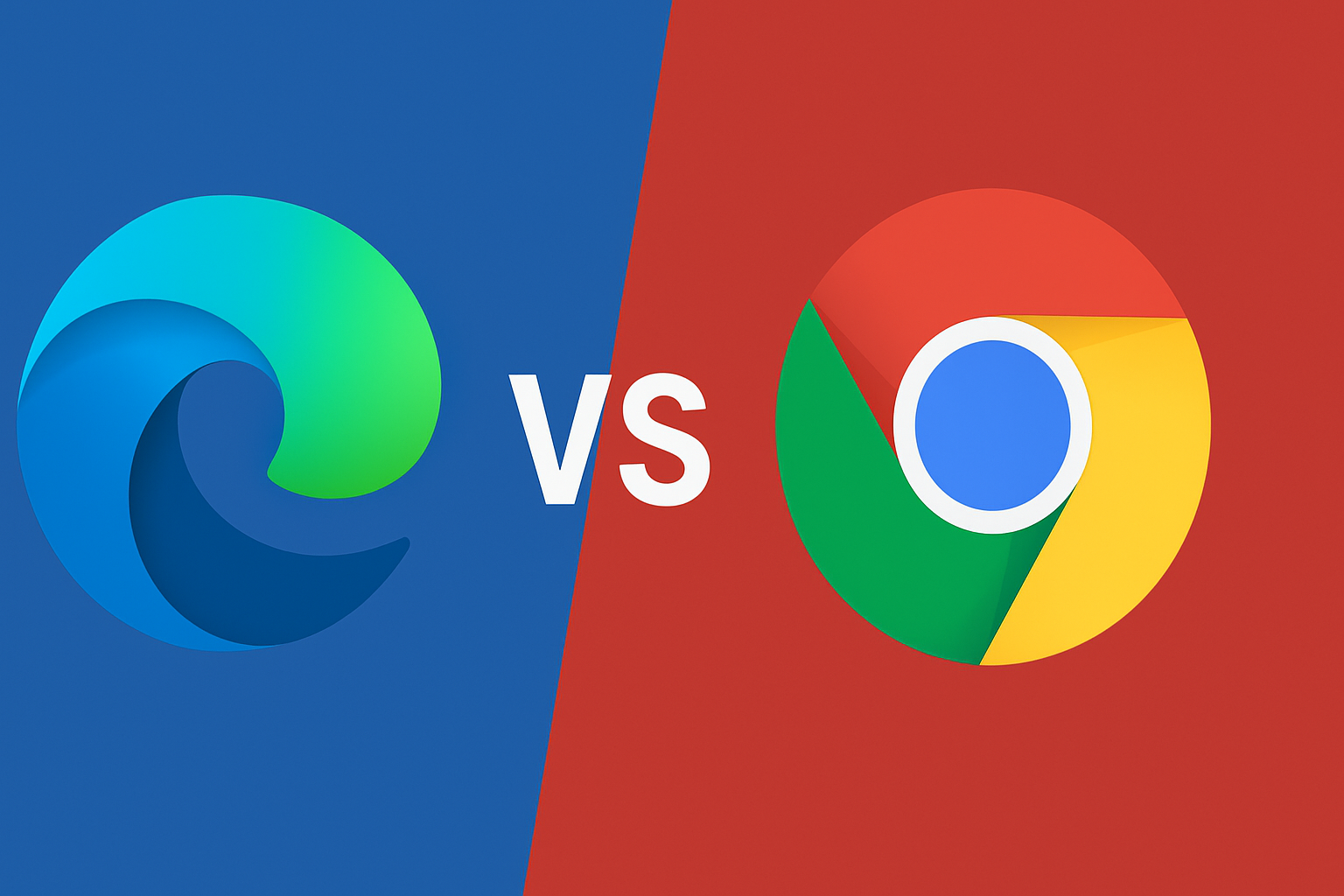This article is about Microsoft Edge vs Google Chrome performance, which to help you choose the best browser for your needs.
Microsoft Edge and Google Chrome lead the pack as popular web browsers in 2025.
Your browser’s performance directly impacts your daily digital life, influencing how fast pages load, how quickly the browser responds, and how efficiently it uses your computer’s resources.
While both browsers now share the same underlying Chromium engine, Microsoft and Google implement unique optimizations, leading to distinct performance characteristics.
Microsoft Edge vs. Google Chrome Performance: Benchmark Battles
Standardized tests, or benchmarks, help measure browser performance.
WebXPRT 3: This test measures HTML5 and JavaScript performance. Recent results show Edge scoring slightly higher (76) than Chrome (73), indicating a minor edge in specific tasks.
Speedometer: Focused on web app responsiveness, Speedometer tests show mixed results. Sometimes Chrome performs slightly better, especially on older hardware, while other tests show varying results, often with Safari leading overall.
MotionMark: Evaluating graphics rendering, MotionMark tests also vary. Some show Edge ahead, while others place Safari at the top, with Chrome and Edge having comparable scores.
These benchmarks highlight that performance isn’t clear-cut; results depend on the test, hardware, and browser version. Edge leads slightly in some areas, while Chrome excels or matches it in others.
The Resource Race: CPU and RAM Efficiency
Efficient CPU and RAM usage is vital, especially on less powerful devices.
RAM Usage: Edge consistently uses less RAM than Chrome in tests, especially with many tabs open.
For example, with six tabs, Edge used 665 MB versus Chrome’s 1.4 GB. With sixty tabs, Edge used 2.9 GB compared to Chrome’s 3.7 GB.
Edge’s “Sleeping Tabs” feature helps by putting inactive tabs to sleep, saving resources.
While generally more efficient, some users report high RAM usage in specific situations.
CPU Usage: Edge often uses slightly less CPU than Chrome.
Tests suggest Edge might be the most CPU-efficient browser overall.
However, user experiences vary based on tasks (like video streaming) and operating systems (e.g., Mac).
Overall, Edge generally manages resources more efficiently, particularly RAM, which benefits multitasking and devices with limited memory.
Under the Hood: JavaScript Engine
Both Edge and Chrome use Google’s V8 JavaScript engine, known for speed thanks to Just-In-Time (JIT) compilation.
This shared engine means JavaScript performance is often similar. However, differences exist.
Chrome introduced optimizations like the “Sparkplug” compiler, while Edge experimented with a “Super-Duper Secure Mode” that disables JIT, potentially impacting performance for enhanced security.
First Impressions: Page Loading Speed
How fast pages appear is crucial.
Comparisons yield mixed results.
Some analyses suggest Chrome loads pages faster, while others find Edge is equally fast or even faster.
User opinions also vary. Many find the speed difference negligible in everyday use.
Both browsers use the Blink rendering engine, derived from WebKit, meaning their core rendering abilities are similar.
Factors like network speed, website complexity, and extensions heavily influence perceived load times.
Power Efficiency: Battery Life Matters
For laptop users, battery life is key.
Edge generally offers better battery life than Chrome, especially on Windows.
Tests show Edge lasting significantly longer during Browse or video streaming.
Features like “Efficiency Mode” and “Sleeping Tabs” contribute to this by reducing resource use. Chrome also has power-saving features (“Energy Saver,” “Memory Saver”), but Edge often comes out ahead in Windows environments.
Keep in mind that results can vary based on hardware and operating system.
The Extension Equation: Functionality vs. Performance
Extensions add features but can impact performance by consuming CPU, RAM, and battery.
Too many or poorly optimized extensions cause slowdowns.
Edge features an “Extension Performance Detector” that alerts users if an extension is slowing things down, allowing easy disabling.
Chrome offers a Task Manager to monitor extension resource use manually.
While both have large extension libraries (Edge can use Chrome extensions), Edge’s detector provides a user-friendly way to manage performance impacts.
Choosing Your Performance Champion
So, Edge or Chrome?
Choose Edge if: You prioritize RAM efficiency, CPU usage, and battery life, especially on Windows devices.
Its tools like Sleeping Tabs and the Extension Performance Detector are also beneficial.
Choose Chrome if: You seek potentially marginal speed advantages in certain benchmarks, are deeply integrated into the Google ecosystem, or need the absolute widest selection of extensions immediately (though Edge compatibility is high).
Both browsers deliver fast, reliable experiences thanks to their shared Chromium foundation.
The best choice hinges on your specific needs and Browse habits. Consider trying both to see which performs best for you.
Further Reading and Resources:
- Browser Benchmarks: Test browser performance yourself at BrowserBench.org.
- Browser Comparisons: See comparisons from tech publications like PCMag or Kinsta.
Read more: Is Microsoft Edge better than Chrome
IT Security / Cyber Security Experts.
Technology Enthusiasm.
Love to read, test and write about IT, Cyber Security and Technology.
The Geek coming from the things I love and how I look.

